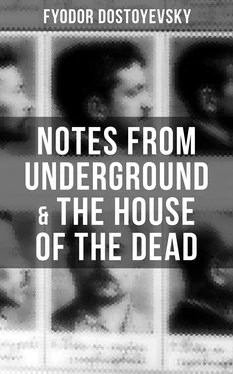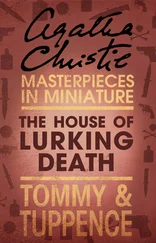Prisons are always full of degraded types who have never learned to work, but who are endowed with skill and daring: their only capital is their back. They often decide to put it into circulation, and propose to the drink-seller to introduce vodka into the barracks. There is always in the town a soldier, a shopkeeper, or some loose woman who, for a stipulated sum-quite a small one-buys vodka with the drink-seller’s money, hides it in a place known to the convictsmuggler, near the workshop where he is employed. The person who supplies the vodka almost always tastes the precious liquid as he is carrying it to the hiding-place, and never hesitates to replace what he has drunk with pure water. The purchaser may take it or leave it, but he cannot take a high hand. Rather, he thinks himself very lucky that his money has not been stolen, and that he has received some kind of vodka in exchange. The man who is to take it into the prison-to whom the drink-seller has made known the hiding-place-goes to the source of supply with bullock’s intestines (which have been washed and ruled with water, and which thus preserve their softness and suppleness), fills them with vodka, and rolls them round his body. Now all the cunning, the adroitness of this daring convict is shown. The man’s honour is at stake. It is necessary for him to deceive the escort and sentry; and deceive them he will. If the carrier is artful, the escort-sometimes a mere recruit-notices nothing unusual, for the prisoner has studied him thoroughly and has artfully combined the hour and the place of meeting. If the convict-a bricklayer, for example-climbs up on a wall that he is building, the escort will certainly not climb up after him to watch his movements. Who then, will see what he is about? On nearing the prison, he gets ready a piece of fifteen or twenty kopecks, and waits at the gate for the corporal on guard.
The corporal examines, feels, and searches each convict on his return to barracks, “and then opens the gate to him. The smuggler hopes he will be too modest to search him too much in detail. But if the corporal is a cunning fellow, that is just what he will do: and in that case he finds the contraband vodka. The convict has now only one chance of salvation. He slips into the corporal’s hand the coin which he holds ready, and often, thanks to this manuvre, the vodka arrives safely in the hands of the drink-seller. Sometimes, however, the trick does not succeed, and it is then that the smuggler’s sole capital really enters into circulation. A report is made to the governor, who sentences the unhappy culprit to a thorough flogging. As for the vodka, it is confiscated. The smuggler undergoes his punishment without betraying the speculator, not because such a denunciation would disgrace him, but because it would bring him nothing. He would be flogged all the same, and his only consolation would be that the drink-seller would share his punishment; but as he needs him he does not denounce him, although, having allowed himself to be surprised, he will receive no payment.
Denunciation, however, flourishes in prison. Far from hating spies or keeping apart from them, the convicts often make friends of them. If anyone had taken it into his head to try and prove to them the baseness of betraying a fellow prisoner, no one would have understood. The former nobleman of whom I have already spoken, that cowardly and violent creature with whom I had broken off all relations immediately after my arrival in the fortress, was a friend of Fedka, the governor’s body-servant. He used to tell him everything that went on, all of which was naturally passed on to the servant’s master. Everyone knew it, but no one thought of showing any ill will against the man, or of reproaching him with his conduct. When the vodka arrived without accident, the speculator paid the smuggler and made up his accounts. His merchandise had already cost him sufficiently dear; and in order that his profit might be greater, he diluted it still further by adding fifty per cent water. He was then ready, and had only to wait for customers.
On the first holiday, or perhaps even on a weekday, he would be approached by a convict who had been working like a Negro for many months in order to save up, kopeck by kopeck, the small sum which he was resolved to spend all at once. He had for long looked forward to days of rejoicing, dreamed of them during the endless winter nights, during his hardest labour; and the prospect had supported him under the severest trials. The dawn of this day so impatiently awaited has just appeared. He has some money in his pocket. It has been neither stolen from him nor confiscated. He is free to spend it. Accordingly he takes his savings to the drink-seller, who, to begin with, gives vodka which is almost pure-it has been only twice baptized-but gradually, as the bottle gets more and more empty, he fills it up with water. Accordingly the convict pays for his vodka five or six times as much as he would in a tavern.
It may be imagined how many glasses, and, above all, what sums of money are required before he is drunk. However, as he has lost the habit of drinking the little alcohol which remains in the liquid intoxicates him rapidly enough. He goes on drinking until there is nothing left; he pledges or sells all his new clothes-for the drink-seller is at the same time a pawnbroker. As his personal garments are not very numerous he next pledges the clothes supplied to him by the Government. When the drink has made away with his last shirt, his last rag, he lies down and wakes up the next morning with a fearful headache. In vain he begs the drink-seller to give him credit for a drop of vodka in order to remove his depression; he meets with a direct refusal. So that very day he sets to work again, and for several months together he will weary himself out while looking forward to one more debauch like that which has now vanished into the past. Little by little he regains courage while waiting for such another day which is still far off, but which will ultimately arrive. As for he drink-seller, if he has gained a large sum-perhaps a dozen roubles or so-he procures some more vodka, but this time he does not baptize it, because he intends it for himself. Enough of trade! it is time for him to amuse himself. Accordingly he eats, drinks, pays for a little music-his means allow him to grease the palm of the junior officials. This festival lasts sometimes for several days. When his stock of vodka is exhausted, he goes and drinks with the other drink-sellers who are waiting for him. There he swallows his last kopeck. However careful the convicts may be in watching over their companions in debauchery, it sometimes happens that the governor or the officer on guard notices what is going on. The drunkard is then dragged to the orderly-room, his money is confiscated if he has any left, and he is flogged. The convict shakes himself like a beaten dog, returns to barracks, and, after a few days, resumes his trade as a drink-seller.
It sometimes happens that among the convicts there are admirers of the fair sex. For a sufficiently large sum of money they succeed, accompanied by a soldier whom they have corrupted, in getting secretly out of the fortress into a suburb instead of going to work. There, in an apparently quiet house, a banquet is held, at which large sums of money are spent. The convicts’ money is not to be despised; accordingly the soldiers will sometimes arrange these temporary escapes beforehand, sure as they are of being generously recompensed. Generally speaking, these soldiers are themselves candidates for the convict prison. The escapades are scarcely ever discovered. I must add that they are very rare, for they are very expensive, and the admirers of the fair sex are obliged to have recourse to other less costly means.
Soon after my arrival, a young convict with very regular features excited my curiosity. His name was Sirotkin, and he was in many respects an enigmatic being. It was his face that particularly interested me. He was not more than twenty three years of age, and he belonged to the special section; that is to say, he was condemned to hard labour for life. He was accordingly to be looked upon as one of the most dangerous of military criminals; yet he was mild and tranquil, spoke little, and rarely laughed. His blue eyes, clear complexion and fair hair gave him a soft expression, which even his shaver crown did not destroy. Although he had no trade, he managed to obtain money from time to time. He was re markably lazy, and always slovenly dressed; but if anyone was generous enough to present him with a red shirt he was beside himself with joy at having a new garment, and exhibited it everywhere. Sirotkin neither drank nor played, and scarcely ever quarrelled with other convicts. He walked about with his hands in his pockets, peacefully and with a pensive air. What he was thinking of I cannot say. When anyone called to him and asked him a question, he answered with deference precisely, and without chattering like the others. He had in his eyes the expression of a child often. When he had money he bought none of those things which others looked upon as indispensable. His vest might be torn, but he did not get it mended, any more than he bought himself new boots. He was particularly fond of the little white rolls and also of gingerbread, which he would eat with the satisfaction of a child of seven. When not at work he wandered about the barracks; when everyone else was occupied, he stood with his arms hanging at his sides; if anyone joked with him or laughed at him-which happened often enough-he turned on his heel without speaking and went elsewhere. If the pleasantry was too strong he blushed. I often asked myself for what crime he could have been condemned to hard labour. One day, when I was ill and lying in hospital, Sirotkin was also there, stretched out on a bedstead not far from me.
Читать дальше












